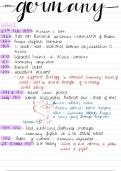Summary
Summary GCSE History Germany timeline
- Course
- Institution
GRADE 9 timeline of all events in the GCSE History specification. Helped me achieve a grade 9. Covers all events concisely with key points such as key people involved, key figures, factors and consequences etc. Extremely useful revision aid.
[Show more]



